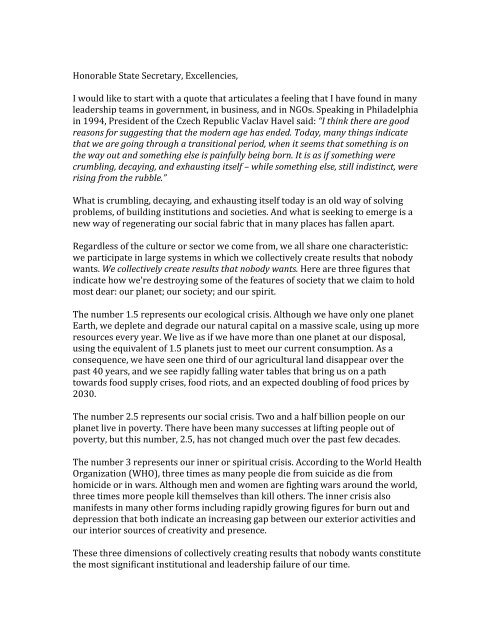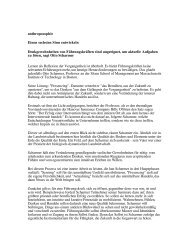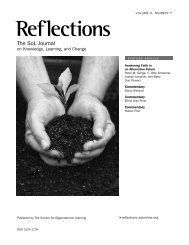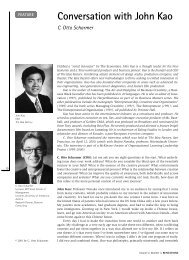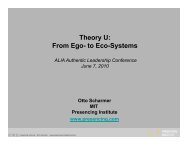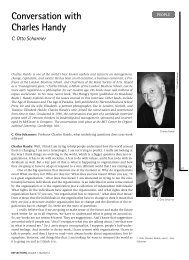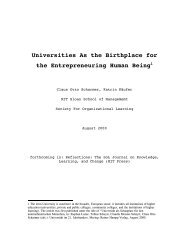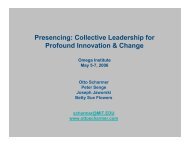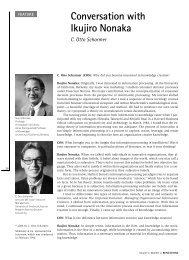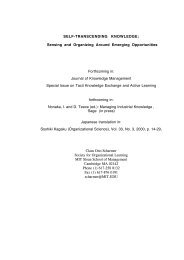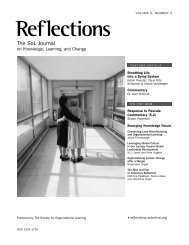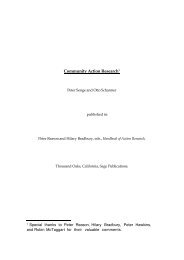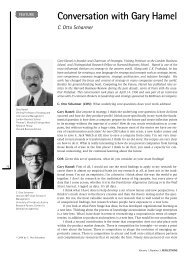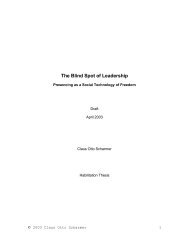Leading from the Emerging Future Minds for Change - Otto Scharmer
Leading from the Emerging Future Minds for Change - Otto Scharmer
Leading from the Emerging Future Minds for Change - Otto Scharmer
You also want an ePaper? Increase the reach of your titles
YUMPU automatically turns print PDFs into web optimized ePapers that Google loves.
Honorable State Secretary, Excellencies,<br />
I would like to start with a quote that articulates a feeling that I have found in many<br />
leadership teams in government, in business, and in NGOs. Speaking in Philadelphia<br />
in 1994, President of <strong>the</strong> Czech Republic Vaclav Havel said: “I think <strong>the</strong>re are good<br />
reasons <strong>for</strong> suggesting that <strong>the</strong> modern age has ended. Today, many things indicate<br />
that we are going through a transitional period, when it seems that something is on<br />
<strong>the</strong> way out and something else is painfully being born. It is as if something were<br />
crumbling, decaying, and exhausting itself – while something else, still indistinct, were<br />
rising <strong>from</strong> <strong>the</strong> rubble.”<br />
What is crumbling, decaying, and exhausting itself today is an old way of solving<br />
problems, of building institutions and societies. And what is seeking to emerge is a<br />
new way of regenerating our social fabric that in many places has fallen apart.<br />
Regardless of <strong>the</strong> culture or sector we come <strong>from</strong>, we all share one characteristic:<br />
we participate in large systems in which we collectively create results that nobody<br />
wants. We collectively create results that nobody wants. Here are three figures that<br />
indicate how we’re destroying some of <strong>the</strong> features of society that we claim to hold<br />
most dear: our planet; our society; and our spirit.<br />
The number 1.5 represents our ecological crisis. Although we have only one planet<br />
Earth, we deplete and degrade our natural capital on a massive scale, using up more<br />
resources every year. We live as if we have more than one planet at our disposal,<br />
using <strong>the</strong> equivalent of 1.5 planets just to meet our current consumption. As a<br />
consequence, we have seen one third of our agricultural land disappear over <strong>the</strong><br />
past 40 years, and we see rapidly falling water tables that bring us on a path<br />
towards food supply crises, food riots, and an expected doubling of food prices by<br />
2030.<br />
The number 2.5 represents our social crisis. Two and a half billion people on our<br />
planet live in poverty. There have been many successes at lifting people out of<br />
poverty, but this number, 2.5, has not changed much over <strong>the</strong> past few decades.<br />
The number 3 represents our inner or spiritual crisis. According to <strong>the</strong> World Health<br />
Organization (WHO), three times as many people die <strong>from</strong> suicide as die <strong>from</strong><br />
homicide or in wars. Although men and women are fighting wars around <strong>the</strong> world,<br />
three times more people kill <strong>the</strong>mselves than kill o<strong>the</strong>rs. The inner crisis also<br />
manifests in many o<strong>the</strong>r <strong>for</strong>ms including rapidly growing figures <strong>for</strong> burn out and<br />
depression that both indicate an increasing gap between our exterior activities and<br />
our interior sources of creativity and presence.<br />
These three dimensions of collectively creating results that nobody wants constitute<br />
<strong>the</strong> most significant institutional and leadership failure of our time.


